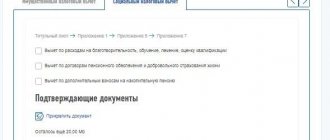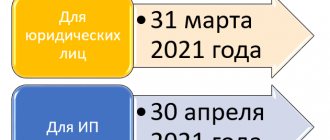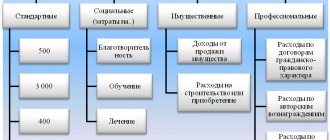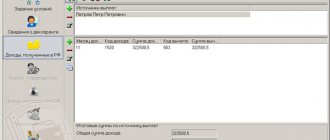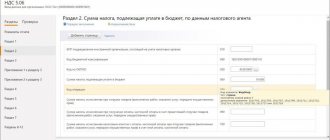When is an updated declaration needed?
Sometimes it happens that after submitting a tax return, an accountant finds an error in the calculations and thus it turns out that the tax was calculated incorrectly.
What to do in this situation? The answer is obvious: it is necessary to correct the accounts and recalculate the tax. If the tax amount turns out to be underestimated, the accountant is obliged to submit an updated declaration (paragraph 1, clause 1, article 81 of the Tax Code of the Russian Federation). If the error did not lead to a tax reduction, then you can do without clarification. Here, the right to choose remains with the organization (paragraph 2, paragraph 1, article 81 of the Tax Code of the Russian Federation, letter of the Ministry of Finance dated September 27, 2017 No. 03-02-07/1/62596). The adjusted declaration reflects the amount of tax calculated taking into account changes that have occurred or an error discovered. The results of tax audits carried out during the period of submission of the clarification should not affect the calculation of the tax base and the tax amount itself (subclause 2, clause 3.2 of the procedure for filling out an income tax return, approved by order of the Federal Tax Service dated September 23, 2019 No. ММВ-7-3/ [email protected] , below is the order).
Important! The income tax return for 2021 is submitted using a new form. Comments and a sample from ConsultantPlus will help you fill it out. Trial access to the system can be obtained for free.
What are the consequences of submitting an updated declaration?
You should always remember that following the submission of an updated declaration with a reduced tax amount, tax authorities can conduct an on-site tax audit for the updated tax period, and they can do this even if this period has already been audited (paragraph 6, paragraph 10, article 89 of the Tax Code RF).
Before submitting an updated declaration (if the accountant initially underestimated the tax amount), the company will need to pay additional tax to the budget and, in addition, pay penalties. An organization can avoid a fine if:
- Will have time to submit an updated declaration before the deadline for filing the primary one (clause 2 of Article 81 of the Tax Code of the Russian Federation).
- The deadline for paying the tax has not expired and the organization submitted an update before it learned about the discovery of errors by the tax authorities or the appointment of an on-site tax audit (clause 3 of Article 81 of the Tax Code of the Russian Federation).
- The updated declaration was submitted after the tax payment deadline had expired, but before the company learned that the tax authority had discovered errors or scheduled an on-site tax audit. In this case, you need to pay the arrears and penalties before submitting the updated declaration (subclause 1, clause 4, article 81 of the Tax Code of the Russian Federation).
Penalty Calculator will help you calculate penalties .
- The deadline for paying the tax has expired, and the updated declaration was submitted after an on-site inspection, the results of which did not reveal any errors or distortions of information (subclause 2, clause 4, article 81 of the Tax Code of the Russian Federation).
The tax agent can also avoid liability under Art. 123 of the Tax Code of the Russian Federation, subject to compliance with the above conditions (paragraph 3, clause 6, article 81 of the Tax Code of the Russian Federation).
The updated declaration is submitted in the form that was in force in the adjusted tax period (clause 5 of Article 81 of the Tax Code of the Russian Federation).
The current income tax return form, as well as the form for submitting an update for previous periods, can be found here.
A mistake made three years ago may lead to a dispute with the tax authorities.
However, the courts have a different view of this problem. Thus, the arbitrators invalidated the decision of the inspectorate to assess the organization’s additional income tax, penalties and fines, due to the fact that it included in the “profitable” expenses of 2010 the amount of depreciation bonus for fixed assets put into operation in December 2005 (resolution AS of the West Siberian District dated July 20, 2015 in case No. 81-4348/2014).
The courts concluded that in 2010 the company rightfully took into account in its expenses the depreciation bonus for facilities put into operation in December 2005. In doing so, they proceeded from the following:
— the provisions of paragraph 3 of paragraph 1 of Article 54 of the Tax Code of the Russian Federation allow the tax base to be adjusted in the period in which errors are discovered. Moreover, even if such errors were made in previous periods, but provided that they led to excessive payment of tax;
— this norm establishes additional guarantees for the protection of taxpayers’ rights. Including the right to account for overpayments that arose due to failure to reflect disputed expenses in an earlier period. It also exempts you from the need to submit an updated tax return if the above errors are identified;
— Article 54 of the Tax Code of the Russian Federation does not establish a statute of limitations for the possibility of correcting errors and distortions in the calculation of the tax base;
— paragraph 3 of paragraph 1 of Article 54 of the Tax Code of the Russian Federation does not establish restrictions on the accounting of tax benefits depending on the period of its occurrence and does not contain a direct indication that the provisions of Article 54 of the Tax Code of the Russian Federation are applied in conjunction with the provisions of Article 78 of the Tax Code of the Russian Federation. That is, taking into account the rule on a restrictive three-year period for offset or refund of overpaid taxes.
As a result, the judges of the AS of the West Siberian District rejected the tax authorities’ arguments about the impossibility of reducing current payments for previously overpaid tax due to the expiration of the three-year period established by Article 78 of the Tax Code of the Russian Federation.
Important
The clarification creates the risk of conducting an on-site tax examination even beyond three years.
As you can see, if you correct an error in the current period that occurred in the previous tax period, which lies outside the three previous years, it can most likely lead to a dispute with the tax authorities. It is quite difficult to predict in advance which side the judges will take. And if you are not ready to defend your position in a dispute with inspectors and in court, you can follow the recommendations of the Ministry of Finance. And do not make accounting adjustments to reduce the tax base of the current period.
After the clarification was submitted, the organization ceased to exist
After the reorganization of the enterprise, the updated declaration is submitted by its legal successor at the place of its registration or at the place of registration as the largest taxpayer (clause 2.6 of the procedure).
In this case, on the title page of the updated declaration submitted by the successor, the TIN and KPP of the successor organization and its name must be indicated, and the TIN and KPP of the reorganized organization (its separate division) must be indicated on separate lines.
In section 1 of the updated declaration submitted by the successor for the reorganized organization (its separate division), OKTMO is indicated at the location of the latter (clause 4.5 of the procedure).
If a company moves and changes its address, then the clarification will need to be submitted to the tax authority with which it will be registered, but the OKTMO code is indicated the same as in the initial declaration (letter of the Federal Tax Service of Russia for Moscow dated October 30, 2008 No. 20-12/101962).
It is necessary to note that all explanations from officials were given at the time when the OKATO code was applied. In connection with the replacement of the OKATO code with the OKTMO code, it must be assumed that all the above conclusions have not lost their relevance at the present time.
You also need to keep in mind that if an organization or its OP changes its location and pays taxes or advances during the year to the budgets of different constituent entities of the Russian Federation, the corresponding number of pages of subsections 1.1 and 1.2 of Section 1 can be presented as part of the clarification.
For example, if the address is changed on August 1, in the updated declaration for the half-year, the amount of additional payment (reduction) of the advance for the half-year and the monthly advance payment due “no later than July 28” are indicated in subsections 1.1 and 1.2 of Section 1 with the OKTMO code at the old location. On a separate page of subsection 1.2 of Section 1 with the new OKTMO code, the amounts of advances with payment deadlines “no later than August 28” and “no later than September 28” are given.
This is stated in paragraph 4.6 of the order.
When moving a unit, in the clarification, fill in the details “TIN/KPP of the (closed) separate subdivision that has changed the powers”, indicating here the old checkpoint of the separate unit (clause 2.8 of the procedure).
If you have access to ConsultantPlus, check whether you need to submit an update. If you don't have access, get a free trial of online legal access.
The organization has/had separate divisions
If the OP continues to work, the update is submitted to the same place where the initial declaration was submitted.
If a division is closed, updated declarations for it, as well as declarations for subsequent (after closure) reporting periods and the current tax period, are submitted to the Federal Tax Service at the location of the organization or at the place of its registration as the largest taxpayer (clause 2.6 of the procedure).
In this case, the title page indicates code 223 and the checkpoint at the location of the organization (the largest taxpayer), and in the details “TIN/KPP of the (closed) separate unit that changed the powers” - the checkpoint of the closed separate unit (clause 2.7 of the procedure).
If separate divisions of an organization switch to paying tax through a responsible division (parent organization), then an updated declaration must be submitted at the place of registration of the latter (letter of the Federal Tax Service of Russia dated June 30, 2006 No. GV-6-02/664).
If the OP was responsible, and then ceased to be so, according to the details “TIN/KPP of the (closed) separate unit that changed the powers”, you need to indicate the checkpoint at the location of the former responsible separate unit (clause 2.8 of the procedure).
Cover letters: what are they and why does the Federal Tax Service ask for them?
A cover letter is a paper that lists the submitted materials and explanations for them. This addition significantly facilitates the interaction of the tax service with taxpayers, since:
- the list of submitted materials allows you to avoid possible misunderstandings regarding the completeness of the set of papers;
- it is easier for office workers to register incoming correspondence, and tax officials will not have questions regarding the purpose of providing certain documents;
- papers will reach the addressee faster.
Existing legislation does not establish a unified form of cover letter. But there are regulations that must be relied upon when carrying out document flow with the Federal Tax Service. This is the order of the Federal Tax Service of Russia dated 07/08/2019 No. ММВ-7-19/ [email protected] and “Methodological recommendations for organizing electronic document management...”, approved by the order of the Federal Tax Service of the Russian Federation No. ММВ-7-6/ [email protected] dated 06/13/2013.
In addition, there are formats approved exclusively for messaging via telecommunications channels. Appendix No. 5 to the Federal Tax Service order No. ММВ-7-6/ [email protected] approved a sample cover letter to the tax office for a power of attorney for filing electronic reports, which is automatically transmitted when submitting tax returns by proxy via EDI. It will not be possible to find such an information message in a traditional written format, but it is not necessary, since it is designed to verify the authority of persons submitting reports for taxpayers online (see letter of the Federal Tax Service dated August 10, 2016 No. GD-4-11 / [email protected] ) .
Another example of an exclusively electronic type of explanation is a sample cover letter for an audit report to the tax office, the format of which was approved by order of the Federal Tax Service dated January 18, 2017 No. ММВ-7-6/ [email protected] As the Ministry of Finance clarifies in the information message dated December 25, 2019 No. IS -accounting-21, the online audit report is sent along with the accompanying document, but if you submit it on paper, additional clarifications on the approved format will not be needed.
Results
The obligation to submit an updated declaration arises only if the taxpayer independently discovers non-payment of tax. In the case of separate divisions, when changing the address or reorganization, there are specifics associated with the procedure for reflecting OKTMO, KPP in the updated declarations, as well as the place of their submission. By following certain rules, when submitting an amendment with an increase in the amount of tax, you can avoid liability under Art. 120, 122 Tax Code of the Russian Federation. However, it must be taken into account that its submission may entail an on-site tax audit.
Read about the specifics of generating updated declarations for other taxes in the following articles:
- “How to make an updated VAT return in 2021”;
- “Features of the updated tax return 3-NDFL”;
- “How to submit an updated tax return under the simplified tax system?”
You can find more complete information on the topic in ConsultantPlus. Free trial access to the system for 2 days.
Final decision
At the same time, the Federal Tax Service emphasizes the importance of compliance with the procedures established by the Tax Code. Thus, if violations of the legislation on taxes and fees are detected during a desk audit, officials conducting a control event must draw up an inspection report in the prescribed form within 10 days after its completion (Article 100 of the Tax Code of the Russian Federation). This document, together with other inspection materials, as well as written objections to the specified act submitted by the person being inspected, are considered by the head or deputy head of the tax authority that conducted the audit, in accordance with the provisions of the Tax Code of the Russian Federation (Article 101 of the Tax Code of the Russian Federation).
Based on the results of consideration of the materials, a decision is made to bring or refuse to bring to justice for committing an offense or a decision to carry out additional tax control measures. The resolution must be adopted within 10 days from the date of expiration of the deadline for the firm to submit objections (which is one month from the date of receipt of the inspection report).
In conclusion, we can conclude that now all organizations submitting updated declarations with a decrease in the amount of tax previously declared for payment or with an increase in losses should be prepared for the possibility of controllers conducting a second on-site or desk audit in relation to the declared adjustment.
